Office of Research & Development |
 |

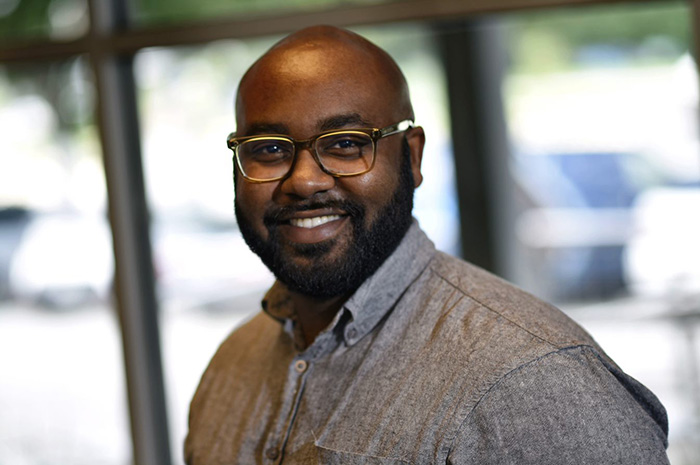
VA researcher Dr. Darius Dawson is working to develop a culturally informed treatment for anxiety that can be delivered in the primary care clinic. (Photo by Agapito Sanchez, Baylor College of Medicine, Houston.)
September 10, 2021
By Erica Sprey
VA Research Communications
"Researchers from minority backgrounds are very passionate about promoting health in their communities."
VA's Office of Research and Development (ORD) chartered an employee-led work group on diversity, equity, and inclusion (DEI) in VA research, in 2020. The group's aims are fourfold: to develop a diverse scientific workforce through training and funding opportunities; to stimulate research focused on minority health and health disparities; to promote a culture of inclusion in the workplace; and to promote equity and diversity in scientific activities. In fiscal year 2021, the DEI program received $1 million in funding.
One important goal of the DEI work group is to fund mentored research experiences for early career investigators from minority backgrounds. To that end, ORD awarded the first group of DEI Research Supplement awards that pair junior researchers with established VA scientists who can help guide their careers.

VA Study Documents Health Risks for Burn Pit Exposures
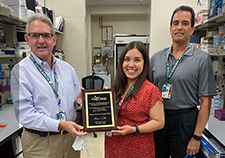
VA center training the next generation of researchers in blood clots and inflammation
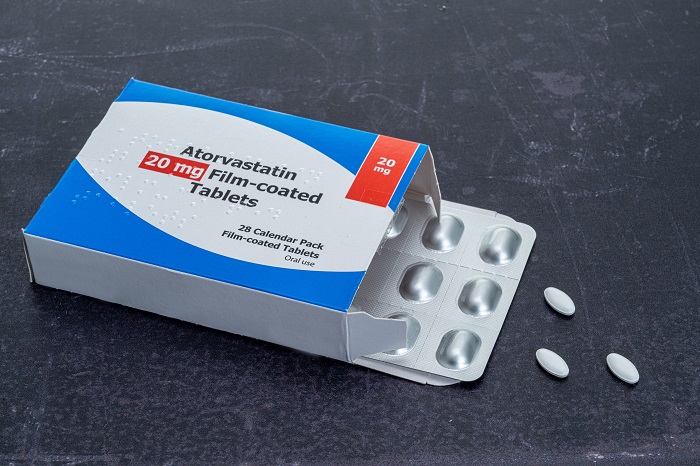
Could cholesterol medicine reduce dementia risk in seniors?
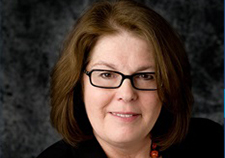
VA Researcher Named One of U.S.’ Top Female Scientists
DEI work group co-chair Dr. Mark Roltsch says diversity in scientific research is fundamental to improving outcomes for patients from minority and underserved backgrounds. As an early career cancer researcher at Howard University in Washington D.C., Roltsch relied on African American colleagues to help him connect with research participants.
"Imagine if I walked into a local barbershop and asked the Black men to come over to the cancer center to get a prostate exam," he says. "These men have no idea who I am and have no reason to trust me." Roltsch says his message was much more effective coming from a researcher who looked like members of that community.
"Researchers from African American and other minority backgrounds are very passionate about promoting health in their communities," Roltsch adds. "For instance, Black men have a much higher risk of dying from prostate cancer than white men. Why is that? That's why we want to get researchers from disadvantaged backgrounds into the research pipeline, to solve those problems."
The Veterans Health Administration runs the nation's largest integrated health care system, spanning more than 1,200 medical centers spread out across the U.S. Attached to these medical centers are over 100 VA research offices, which are also affiliated with world-class academic research institutions, like the University of Pennsylvania and Stanford University. In addition, VA maintains partnerships with many Minority Serving Institutions (MSIs), like Howard University, Spelman College, and Morehouse College. This puts VA in a unique position to mentor and fund researchers from disadvantaged backgrounds who are motivated to make a difference in their communities.
"Scientists and trainees from diverse backgrounds and life experiences bring different perspectives, creativity, and individual enterprise to address complex health-related problems. There are many benefits that flow from a diverse VA-supported workforce," notes the DEI Research Supplement announcement.
Dr. Carol Fowler is the lead for the DEI work group's "Workforce Resources and Opportunities" subcommittee. The committee is charged with creating funding opportunities in mentored research for junior VA investigators from underrepresented backgrounds. These awards, called DEI Research Supplements, pair early-career investigators with established VA researchers with ORD research awards. Each DEI supplement awardee will receive up to $100,000 per year, for two years, to fund their research and to help prepare them to compete for a VA Career Development Award, later in their career.
"There was a high level of interest from the VA research offices," says Fowler. "We received 20 applications for the first round of DEI Research Supplement awards. Most applications were ranked good-to-excellent and covered a diverse range of topics that are highly relevant to Veterans' health care needs."
In July of 2021, ORD funded 10 DEI Research Supplement awards. The research proposals covered topics like virtual reality technology to help Veterans with mild cognitive impairment, repurposing existing drugs to treat substance use disorder, and assessing the effects of the X chromosome on autoimmune diseases, among others.

Vascular surgeon Dr. Olamide Alabi aims to understand patient reported outcomes and concerns for Veterans with peripheral artery disease. (Photo courtesy Olamide Alabi)
Vascular surgeon Dr. Olamide Alabi's DEI Research Supplement award will enable her to study the reasons for delays in care for Veterans with peripheral artery disease (PAD) in the lower extremities. She has been paired with Dr. Luke Brewster, a vascular surgeon and physician-scientist at the Atlanta VA Medical Center.
PAD is a condition where blood flow to the arms or legs is restricted. It is caused by atherosclerotic plaque build-up in the blood vessels, and can trigger pain, skin wounds, and at its worst stage, gangrene. Sometimes the only thing physicians can do for a patient with an advanced case of PAD is amputate the diseased limb.
Communication with patients is key, says Alabi. She would like to understand what concerns are most important to patients, not just their physicians. "My long-term goals are to better understand patient reported outcomes so that we can improve factors that matter to Veterans, not just what matters to physicians who care for Veterans," she says.
Nearly 12 million Americans have PAD in their lower extremities. It is a significant problem in the Veteran population, disadvantaged communities, and in women, Alabi says. "Veterans tend to have a lot of the risk factors that are associated with PAD—smoking, diabetes, and high blood pressure. All of those chronic comorbidities and behaviors are of higher prevalence in Veterans, compared to the general population."
That is why Alabi chose to locate her practice in the southeastern U.S. where the risk factors for PAD are especially prevalent, and where there are greater concentrations of minority communities. Researchers have identified health disparities in treatment and outcomes for PAD, she notes, adding that African Americans have a three to five times higher rate of amputation.
However, Alabi does not believe poor outcomes in African Americans are related to biology or an unwillingness to seek care. "I find it hard to believe that someone has a higher risk of amputation simply because of the color of their skin, or that they do not care about their health. I believe it has more to do with the social determinants of health," like access to nutritious food or adequate transportation. "Maybe it is 'place,' not race," she says.
As a researcher and clinician, Alabi knows a lot about the pathophysiology of peripheral artery disease (PAD), its prevalence in African Americans, and the reasons why early interventions are so vital to preventing lower-limb amputations. But she also understands the disease on a personal level, as a woman of color.
Alabi was raised amid the cornfields of Nebraska and in urban Washington D.C. by immigrant parents who came to the U.S. from Nigeria to pursue graduate education. Her father holds a PhD in agronomy and her mother has an advanced degree in social work. However, she learned early on that academic excellence and hard work didn't always mean good access to education or career opportunities.
"I distinctly remember attending a career day in middle school. There were a number of professional experiences like 'spend a day with a pharmacist or doctor,'" says Alabi. "I remember clearly that they sent me to McDonald's. Essentially, they were telling me that other people had a professional trajectory that was different from mine."
Fortunately, that barrier did not deter Alabi. She went on to attend medical school at the University of Nebraska, trained in general surgery at Loma Linda University, and completed a fellowship in vascular surgery at Oregon Health and Science University. Now, she is an assistant professor of surgery at Emory University School of Medicine in Atlanta, an adjunct professor at Morehouse School of Medicine, and a staff surgeon at the Atlanta VA Medical Center.
"Once I began my medical training, the challenges were similar. When you get into these 'professional clubs,' they are usually full of people who look like each other and not like me. It's difficult to infiltrate these groups—however, being from an underrepresented minority group, and a woman, I have to do it all the time, so I am used to it," says Alabi. "No matter where I've gone or what I've done, I've always been the first. However, while I may be the first, I will not be the last."
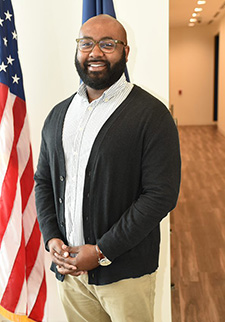
Dr. Darius Dawson is a post-doctoral fellow at the VA South Central Mental Illness Research Education and Clinical Center (MIRECC) in Houston. (Photo by Shawn D. James, Michael E. DeBakey VA Medical Center, Houston.)
VA psychologist Dr. Darius Dawson is finishing a post-doctoral fellowship at the South Central Mental Illness Research Education and Clinical Center (MIRECC) at the Michael E. DeBakey VA Medical Center in Houston. His work focuses on delivering health equity and evidence-based mental health care to underserved Veterans.
He is also an instructor of psychiatry and behavioral sciences at Baylor College of Medicine in Houston. Dawson, a Texas native, trained at the University of Texas at Austin and San Diego State University in California.
Dawson was awarded a DEI Research Supplement award to study a brief cognitive behavioral therapy (CBT) intervention for anxiety in Veterans. He has been paired with two mentors—Dr. Terri Fletcher and Dr. Jeffrey Cully—who he has worked with for more than three years. Fletcher is an internationally recognized expert in anxiety treatment and Cully is a senior health care implementation researcher who's seeking better ways to deliver mental health care to Veterans. Both researchers are affiliated with the Center for Innovations in Quality, Effectiveness and Safety (IQuESt) at the Houston VA.
"I think one of the greatest challenges I've experienced is finding mentors who value my experiences as a Black man and wish to help me to integrate those into my career goals," says Dawson. "One of the reasons I've stayed at the Houston VA is because I've found mentors like Jeff and Terri who make sure we have those conversations about my past experiences.
"I think it is difficult for people of color to advance through education—you go through a lot of hurdles. I have experienced many instances of microaggressions and discrimination. So, it's great when you can find that mentor who understands those issues and supports good communication," says Dawson.
Anxiety is a very common condition that affects close to a third of Americans at some point in their lives, according to the National Institute of Mental Health. It is very prevalent in the Veteran population, as well. Individuals with generalized anxiety disorder can experience daily worries that interfere with their quality of life. Common symptoms include feeling restless, having low energy, finding it difficult to concentrate, and having difficulties falling or staying asleep.
Many Veterans find it hard to ask for and accept help with their emotional struggles. Typically, men are less willing than women to participate in psychotherapy. There are also cultural issues that can complicate acceptance of mental health care, especially in African American and Hispanic communities, according to Dawson. And for many Veterans from underprivileged backgrounds, even finding transportation to a VA clinic can be challenging.
That is why Dawson and his colleagues are working on a brief intervention for anxiety that can be delivered in primary care clinics. "We want to find ways to work with Veterans who are not necessarily seeking mental health care," says Cully. "We can offer them a brief course of treatment that can help them with their mental health problems. We hope to give primary care physicians another tool in the toolbox to help Veterans with anxiety."
The gold standard for anxiety treatment is exposure-based therapy, which takes time to deliver in a precise manner to the patient, says Cully. Repeated exposure to an object or situation that causes fear, in a controlled setting, can help a patient process their fear and increase their tolerance. But that type of therapy can be difficult to deliver in the primary care clinic.
While the parent award examines brief CBT interventions for anxiety, Dawson's DEI supplement will look for ways to better understand and work with cultural values and systemic barriers that can sometimes complicate anxiety treatment for people from minority groups.
Dawson says chronic anxiety can have downstream health effects like heart disease, diabetes, and obesity that disproportionally affect African American and Hispanic individuals. Anxiety is also associated with maladaptive behaviors like substance use and smoking. Part of his work involves developing smoking cessation strategies tailored for minority populations.
"My goal is to identify strategies that can help make sure minority populations have accessible and culturally informed treatment. My work tries to integrate some of the strengths of the African American community to get Veterans to treatment," Dawson said in an interview with Baylor College of Medicine. Part of that work involves partnering with religious leaders to better reach community members.
VA Research Currents archives || Sign up for VA Research updates